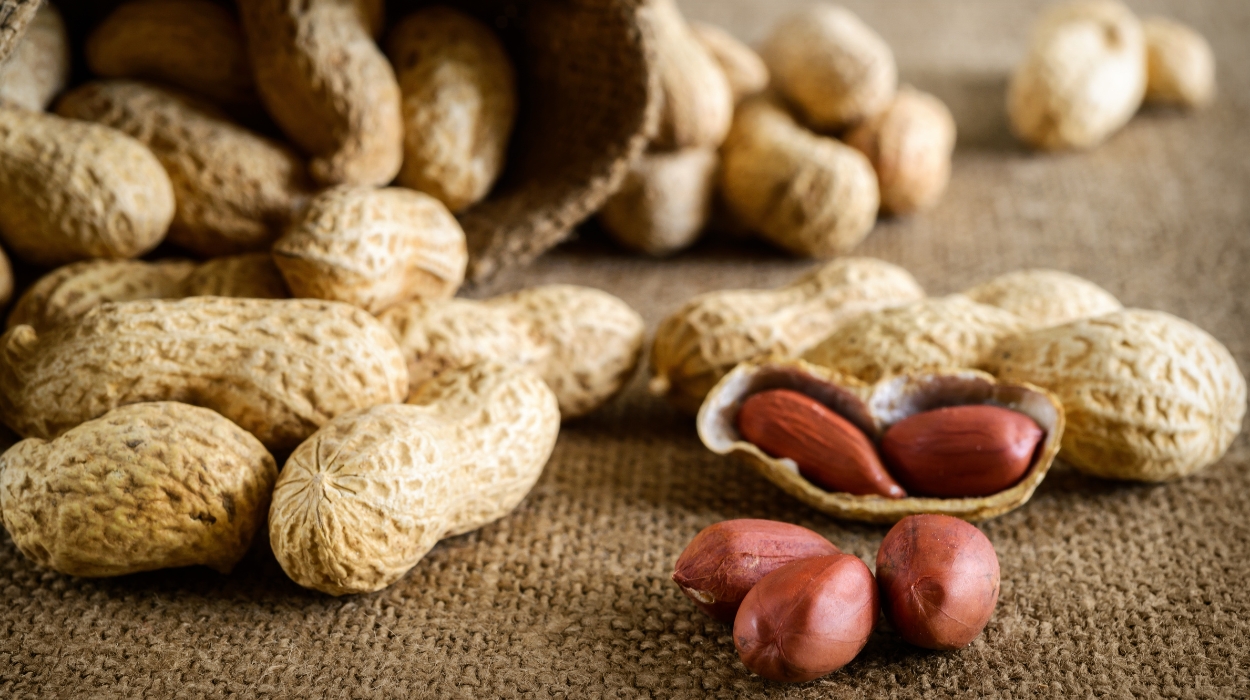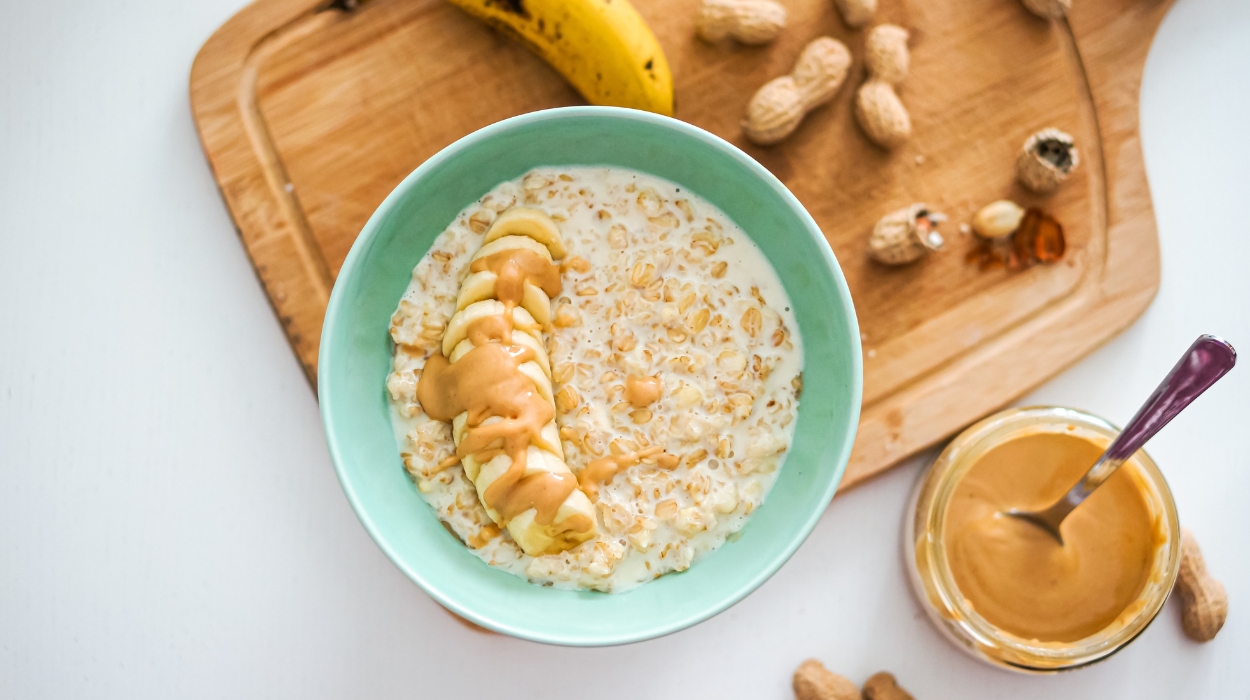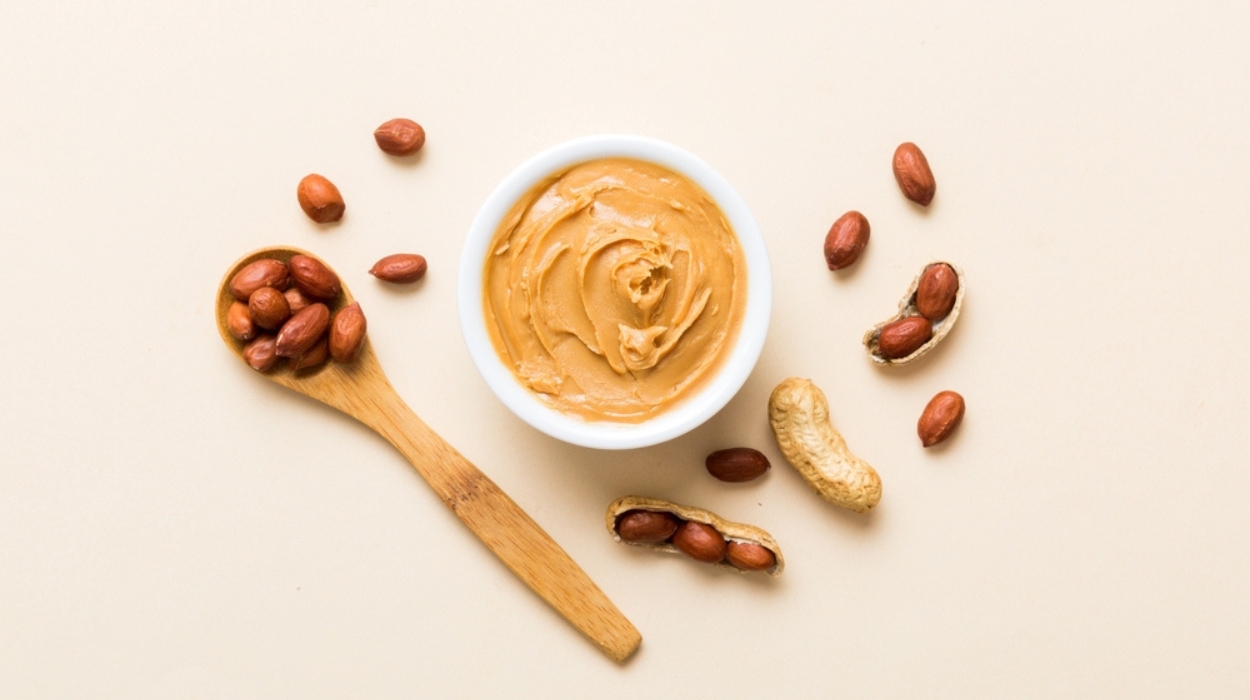Peanuts are grown globally, with China[1] being the lead producer and India in second place. They are also grown in the southern United States, where Georgia[2] is the top producer.
Unless you are allergic, you likely consume peanuts or use some peanut products like peanut oil or peanut butter. But did you know that peanuts may offer health benefits? Peanuts contain plant-based protein, healthy fats, and fiber, essential daily nutrients for optimal body function.
If they are healthy to consume, are peanuts good for weight loss? Newer research suggests this may be true. Continue reading to learn the most current weight loss information about peanuts.
Are Peanuts Good For You To Lose Weight?
Yes, peanuts are good for you to lose weight if consumed in moderation and additionally offer several health benefits. They promote a sense of fullness, which may lead to a decrease in caloric intake. They contain essential nutrients and bioactive compounds such as healthy fats, fiber, and protein. Peanut research shows they promote weight loss and decrease the risk of cardiovascular disease and type 2 diabetes.
Are Peanuts Good For Weight Loss?
In the United States, approximately 74% of adults are classified as having overweight or obesity[3] conditions. Similarly, 67% of Australian adults are overweight or obese as of 2017/2018 statistics.
These statistics represent an increasing trend in the wrong direction. Obesity is associated with several serious medical conditions and their complications, like type 2 diabetes and cardiovascular disease.[4] Improving lifestyle choices, including a more healthful diet and regular exercise, are essential to change the current trajectory.
There is a misconception that peanuts have too many calories, that they are unhealthy and cause weight gain. There is considerable evidence to the contrary. Nut consumption, including walnuts, almonds, and peanuts, is associated with hunger suppression[5] and increased satiety, a sense of fullness.
Given that information, you might wonder, do peanuts help you lose weight?
Noteworthy Research About Peanuts
In a joint study between Texas Tech University and the University of South Australia, trial participants were advised to eat 35 grams of lightly salted dry-roasted peanuts 30 minutes before their two main meals daily. The study showed consuming peanuts before two main meals[6] – in combination with a calorie-restricted diet – resulted in weight loss. This was comparable to the control group, who were instructed to follow a traditional low-fat weight loss diet.
Another noteworthy result in that study showed decreased systolic blood pressure compared to the control group, which could lower cardiovascular disease risk. Also, lower blood sugar levels were found in both the control and the peanut-enriched group.
A randomized controlled trial looked at the effects of regular peanut consumption on women with obesity. They found that women who consumed whole peanuts[7] with skins had lower body weight, waist circumference, and improved body composition. This trial also reported a decrease in total and low-density lipoprotein (bad) cholesterol, as well as inflammation factors.
So, are peanuts good for you to lose weight? Yes. But why?
Why Are Peanuts Good For Losing Weight?

Peanuts, both raw and roasted peanuts, suppress hunger and the desire to eat. Peanut consumers report feelings of fullness and satiety after eating them, which aids weight loss efforts. As part of a weight loss diet plan, peanut intake is associated with decreased body weight, body mass index, and waist circumference compared to those who did not consume peanuts.
Their high unsaturated fat content is one reason peanuts aid weight loss. They contain both monounsaturated fat and polyunsaturated fat. Unsaturated fatty acids oxidize faster, meaning they have a greater thermogenic effect,[8] or calorie-burning effect, than saturated fatty acids.
Foods containing high amounts of fiber and protein are associated with weight loss. The protein and fiber in peanuts aid weight loss because they help slow the digestive process, causing blood glucose stabilization; therefore, there are no spikes in blood sugar.
The Nutritional Value Of Peanuts
Peanuts is a nutrient-dense plant-based food containing vitamins, minerals, and antioxidants. One ounce, about a quarter cup, or 28 grams of raw peanuts[9] contains
- 161 calories.
- 7.3 grams of protein.
- 2.4 grams of dietary fiber.
- 4.6 grams of total carbohydrates.
- 14 grams of fat, with only 1.8 grams of saturated fat.
The fat content in peanuts is mostly healthy fats, monounsaturated and polyunsaturated fatty acids. They contain zero cholesterol.
Since peanuts are higher in healthy unsaturated fats than saturated fatty acids, they have heart health[10] benefits. They can help improve low-density lipoprotein cholesterol levels and lower blood pressure, making for a heart-healthy snack.
Another benefit peanuts offer is that they are low on the glycemic index scale, scoring only 14 on a 100-point scale.[1] This means they have less effect on blood sugar than foods higher on the GI scale.
Bioactive And Nutritional Components Contained In Peanuts
Peanuts contain all 20 amino acids,[11] the building blocks of protein, and have the highest source of arginine. The amino acid arginine[1] is associated with health benefits, including improving blood flow, immune system stimulation, and gastrointestinal tract protection.
Peanuts are an excellent source of resveratrol, a polyphenol antioxidant[1] that protects against cancer, heart disease, degenerative nerve disease, and inflammation.
Phytosterols[11] in peanuts, peanut butter, peanut flour, and peanut oil naturally occur in plants. They help block the body’s ability to absorb cholesterol from food intake and are associated with decreased inflammation.
Phenolic acids and flavonoids[1] in peanuts are thought to have health benefits and protective qualities against cancer and heart disease.
How To Add Peanuts To Your Diet

Below are some healthy and fun options for adding peanuts to your diet:
- Yogurt.
- Oatmeal.
- Salads.
- Smoothies.
- Soups.
- Sauces.
- Noodle or pasta dishes.
- Make trail mix or granola.
- Natural peanut butter.
Ideally, for health benefits, peanut butter’s ingredient label should only list peanuts. Take care when selecting a brand you may not be familiar with since it may have added unhealthy ingredients, such as processed oils or added sugar.
Tips For Eating
A healthy eating plan requires attention to portion size. Consuming nuts is a healthy choice, but being aware of how many you eat is important since they are energy-dense and may be high in sodium. A serving size of peanuts is about one ounce or quarter cup. Therefore, consuming roughly a handful[12] of peanuts is ideal. Try eating lightly salted peanuts, as eating salted peanuts can be a significant source of unwanted sodium.
Therefore, if you are watching your calorie intake, the same approach would be advisable for peanuts. Chocolate-covered peanuts taste great but are less healthy than raw or roasted peanuts.
Eating peanuts has a positive effect on blood glucose (sugar) levels. Research shows when peanuts or peanut butter intake is combined with higher glycemic foods,[13] like a bagel, the result is more stable blood sugar levels.
Studies[6] show that eating peanuts approximately 30 minutes before a meal increased satiety and a sense of fullness; therefore, they helped prevent overeating and decreased long-term weight gain.
A Note About Peanut Safety
Many people are aware that a peanut allergy can have severe consequences. Despite the health benefits and weight loss support they offer, you mustn’t consume peanuts if you have an allergy.
Peanuts can be infected by a fungal species that can produce aflatoxin, which is highly toxic and impairs intake safety. Consuming roasted peanuts versus raw can improve food safety. Evidence shows roasting peanuts reduced the bacterial and fungal load.[11]
Conclusion
Several studies have shown an association between long-term high nut consumption and lower body weight.[11] Research shows that increasing nut consumption is associated with lower weight gain over relatively long periods. Regular peanut consumption can help maintain a healthy weight over time. Study participants also saw improved blood sugar levels.
Incorporating peanuts as a component of a healthy diet is associated with a lower risk of obesity and type 2 diabetes. Research indicates additional health benefits for those who ate peanuts, such as decreased cardiovascular disease risk due to lowered total and LDL cholesterol levels, decreased blood pressure, and decreased inflammatory factors.
The body weight benefits are more notable when peanuts replace unhealthy foods[14] such as red meat, processed meat, potato chips, and French fries. Weight management requires lifestyle changes or management, including regular exercise and eating a healthy diet.
Despite all the calories nuts contain, they are a healthy choice if eaten in the recommended serving amount. Calorie management can be daunting, so here is an informative link to help you find balance. Quality supplements can aid your diet management efforts as well but should be part of a healthy lifestyle plan. Speak with a healthcare provider regarding weight management, lifestyle changes, or supplement use if you seek guidance on a weight loss diet.
Frequently Asked Questions
Research shows that people who ate peanuts as part of an energy-restricted diet demonstrated lower body weight, improved body composition, and decreased waist circumference.
Yes, and research shows peanut intake before meals aided weight loss by improving satiety and a sense of fullness. Peanuts are nutrient-dense and contain bioactive components promoting health and weight management.
Research indicates about 70 grams per day, divided into 35 grams before two main meals, aided weight loss. Overconsumption may cause a calorie surplus, which could derail weight management goals.
Research shows peanuts have health benefits and aid weight loss efforts, but not all nuts have been reported to aid weight loss. The most commonly studied are almonds, walnuts, pistachios, and peanuts.
 Evidence Based
Evidence Based
